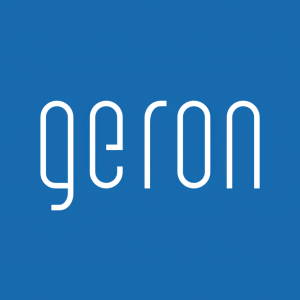Geron Announces Publication of Analyses Comparing Real World Data to IMbark Phase 2 in Annals of Hematology
Analyses Suggest Survival Benefit Associated with Imetelstat Treatment in Comparison to Best Available Therapy
Overall Survival is Primary Endpoint for Ongoing Phase 3 Clinical Trial in Refractory MF
“Across the multiple analyses presented in the publication, the median overall survival for imetelstat-treated patients in our IMbark Phase 2 clinical trial was consistently more than double than the median overall survival for patients treated with best available therapy (BAT) from RWD. For the imetelstat-treated patients, the median overall survival (OS) was approximately 30 months in comparison to approximately 12 months for BAT-treated patients from RWD,” said
The paper describes several statistical adjustment methods and multiple sensitivity analyses to improve comparability of the data set from the Company’s IMbark Phase 2 trial and RWD to mimic the effect of a randomized trial. The authors note consistency in the hazard ratios and statistical significance observed across the multiple analyses, which suggests a survival benefit associated with imetelstat treatment of MF patients after ruxolitinib failure. While acknowledging the limitations of RWD analyses, the authors conclude that the results of these analyses warrant further prospective evaluation of imetelstat in a Phase 3 setting with OS as a primary endpoint.
“The RWD used in this paper was collected from patients treated with BAT at the
The publication is available online at https://link.springer.com/article/10.1007/s00277-021-04683-w.
Ongoing IMpactMF Phase 3 Clinical Trial
IMpactMF is an open label, randomized, controlled Phase 3 clinical trial with registrational intent. The trial is designed to enroll approximately 320 patients with Intermediate-2 or High-risk myelofibrosis who are refractory to prior treatment with a JAK inhibitor, also referred to as refractory MF. Patients will be randomized to receive either imetelstat or best available therapy. The primary endpoint is overall survival (OS). Key secondary endpoints include symptom response, spleen response, progression free survival, complete response, partial response, clinical improvement, duration of response, safety, pharmacokinetics, and patient reported outcomes.
IMpactMF is currently enrolling patients. For further information about IMpactMF, including enrollment criteria, locations and current status, visit ClinicalTrials.gov/NCT04576156.
About Myelofibrosis (MF)
Myelofibrosis, a type of myeloproliferative neoplasm, is a chronic blood cancer in which abnormal or malignant precursor cells in the bone marrow proliferate rapidly, causing scar tissue, or fibrosis, to form. People with MF may have abnormally low or high numbers of circulating red blood cells, white blood cells or platelets, and abnormally high numbers of immature cells in the blood or bone marrow. MF patients can also suffer from debilitating constitutional symptoms, such as drenching night sweats, fatigue, severe itching, or pruritus, abdominal pain, fever and bone pain.
Approximately
About Imetelstat
Imetelstat is a novel, first-in-class telomerase inhibitor exclusively owned by Geron and being developed in myeloid hematologic malignancies. Data from Phase 2 clinical trials provide strong evidence that imetelstat targets telomerase to inhibit the uncontrolled proliferation of malignant stem and progenitor cells in myeloid hematologic malignancies resulting in malignant cell apoptosis and potential disease-modifying activity. Imetelstat has been granted Fast Track designation by the
About Geron
Geron is a late-stage clinical biopharmaceutical company focused on the development and potential commercialization of a first-in-class telomerase inhibitor, imetelstat, in myeloid hematologic malignancies. The Company currently is conducting two Phase 3 clinical trials:
Use of Forward-Looking Statements
Except for the historical information contained herein, this press release contains forward-looking statements made pursuant to the “safe harbor” provisions of the Private Securities Litigation Reform Act of 1995. Investors are cautioned that such statements, include, without limitation, those regarding: (i) that the consistency in the hazard ratios and statistical significance observed across multiple analyses suggests a survival benefit associated with imetelstat treatment of MF patients after ruxolitinib failure; (ii) that imetelstat has potential disease-modifying activity; and (iii) other statements that are not historical facts, constitute forward-looking statements. These statements involve risks and uncertainties that can cause actual results to differ materially from those in such forward-looking statements. These risks and uncertainties, include, without limitation, risks and uncertainties related to: (i) whether in IMpactMF imetelstat is able to actually demonstrate a favorable overall survival compared to BAT in refractory MF patients; (ii) that the comparative analyses between RWD and IMbark clinical trial data have limitations and cannot be relied upon as demonstrative; (iii) whether regulatory authorities permit the further development of imetelstat on a timely basis, or at all, without any clinical holds; (iv) whether imetelstat is safe and efficacious; and (v) whether imetelstat demonstrates disease-modifying activity in IMpactMF. Additional information on the above risks and uncertainties and additional risks, uncertainties and factors that could cause actual results to differ materially from those in the forward-looking statements are contained in Geron’s periodic reports filed with the
View source version on businesswire.com: https://www.businesswire.com/news/home/20211011005605/en/
Chief Financial Officer
investor@geron.com
media@geron.com
Source:







